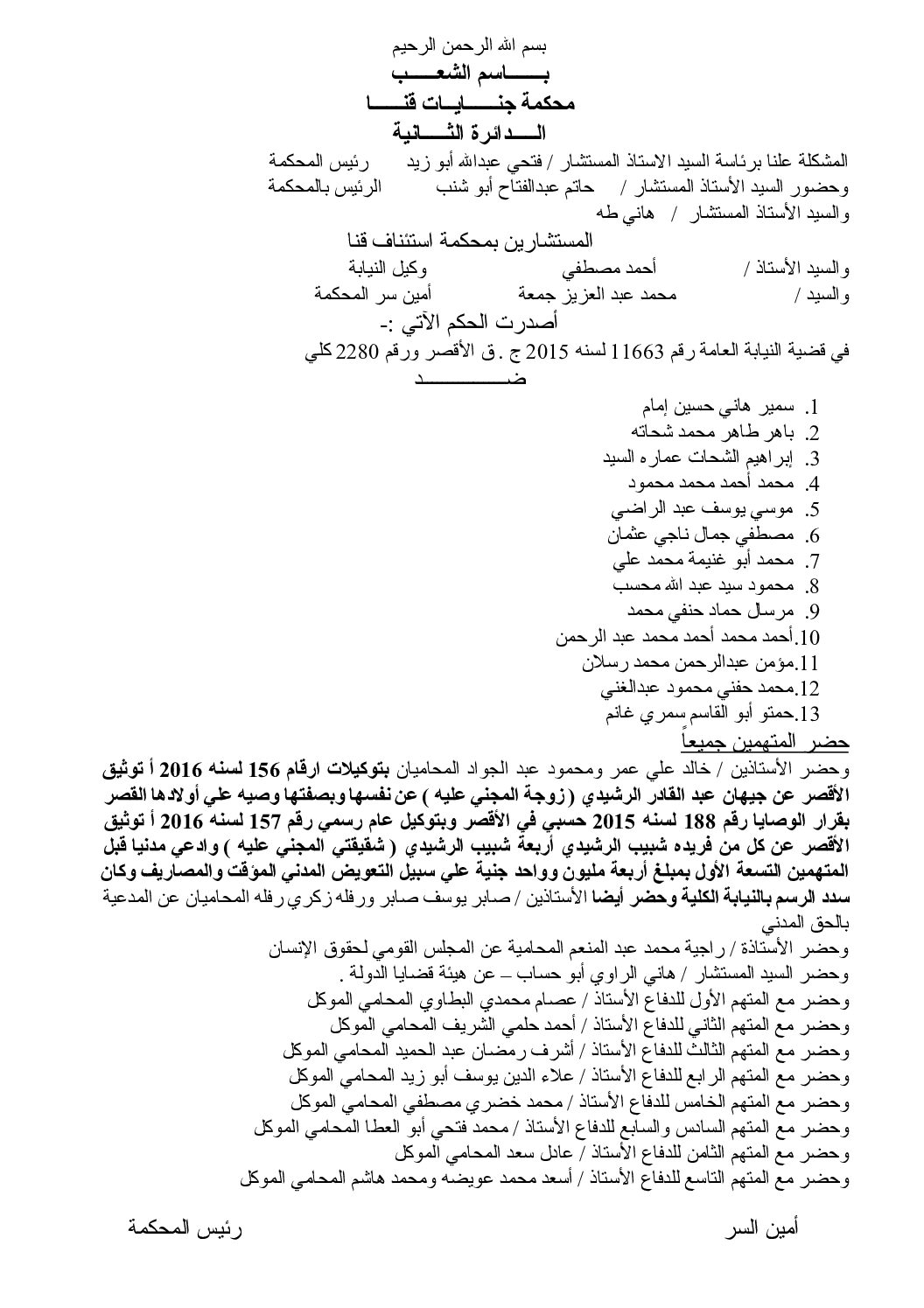Corruption | New Investment Law Unconstitutional and Protects Corruption

Together with several rights organizations, the Egyptian Center for Economic and Social Rights (ECESR) is responding to the flood of constitutionally questionable legislation, which clearly violates the rule of law, the rights of citizens, and the role of the judiciary. ECESR began with a victory, by managing to obtain authorization from the Administrative Court to challenge the constitutionality of Law No.32 of 2014, issued last April. It was signed by the head of the Supreme Constitutional Court, Judge Adly Mansour, in his capacity as Interim President of the Republic, despite being considered one of the worst laws out of a new set of legislations, which allow the squandering of public funds and the rights of the state.
Democratic rule contains three types of oversight, political, administrative, and judicial; its success is based on the effectiveness of them all. Political oversight occurs with the existence of elected bodies entrusted with this role. Administrative oversight is carried out by the executive branch itself and through the laws and decisions guiding its work. But judicial oversight could only exist in one case, which is when the right to litigation is ensured. These rights had been forth in the constitutions, which brought litigating sides closer and organized judicial facilities. However, the above-mentioned law will block the way of such oversight, prohibiting those who have the capacity and interest to appeal decisions from taking legal action. The legislation limits the role of the judiciary in general, and that of the State Council in particular, and could lead to a state of oblivion.
Aspects of Corruption in the Law
The new law is made up of two articles. The first states the inadmissibility of appeals against state contracts, except by the concerned parties (the government and the investor alone). The second article brings to the close all current appeals under consideration by the Administrative Courts. The law provides immunity for former state contracts and allows the signing of new contracts, further squandering state assets and natural resources, which are the property of its citizens, who are the real stakeholders and benefactors of oversight. This right is being appropriated by the government, from the hands of citizens and the judiciary, particularly the administrative courts. This came after several decisions in favor of ECESR and other organizations, which invalidated several corrupt contracts and brought back several authorities and companies sold under suspicious circumstances, to say the least.
In financial crimes, the new law required the issuance of a final decision before the Administrative Court could initiate oversight. It also squandered the principle of equal opportunity between the two litigants, who had equal legal standing, as it differentiates between litigants who had obtained earlier verdicts and those whose cases are currently under consideration who did not do any wrong.
Government’s Justification: Illogical and Unacceptable
The increase in the number of cases against Egypt internationally is perhaps one of the most significant justifications resorted to by successive Egyptian governments, and most recently the government of Ibrahim Mahlab, to give legitimacy to laws prohibiting citizens from taking legal action against contracts between the state and investors. Although Egypt being in fact raked in fourth place among countries facing international litigation, the solution certainly would not lie in denying the right of domestic litigation in corruption cases. On the contrary, it would open the doors wide to litigation by investors internationally, circumventing Egyptian courts and disregarding its decisions. Instead of revising its position from such agreements as many countries are doing, it is unfortunate that Egypt continues to engage in those contracts and is amending its domestic legislation. This is akin to reconciliation with corruption and the abrogation of Egyptian court decisions, which uncovered corruption in several privatization and land sale operations. The law completely blocks the way of domestic litigation and risks more corruption and reconciliation with crimes that threaten Egypt’s economy and Egyptian livelihood.
Another justification claims that the law is necessary to create an investor-friendly environment and attract investment, in addition to avoiding the damage done by appealing against state-investor contracts. However, this does not seem to be based on any acceptable rationale. The only victim of appeals against state-investor contracts are those whose contracting involves the violation of the law or the wasting of public funds. The absence of such contracting irregularities is the only proper buttress against their appeal and annulment. Furthermore, it cannot be acceptable to say that litigation measures in themselves will pose a risk to investors and their interests. In the event of a decision in favor of investors to protect them from incurring further material losses, accepting the argument of moral damage in this context, denies the right to litigate against particular entities and places them above the law. However, the prevention material damage and putting an end to the bleed in state funds as a result of illegal contracts, has the topmost priority, without doubt, if compared to “moral” damage.
***
While the above demonstrated the unconstitutionality of the new law and its aberrations, it cannot be perceived outside the context of legislation and measures taken hastily in the past few months by two governments, which are both temporary and in a transitional period, whose priority should be the peaceful transition of power to an elected president and parliament, with true legitimacy. The primary common factor between these legislation and procedures is their demonstration of a clear bias by interim authorities towards the interests of businessmen and investors, in addition to senior Egyptian bureaucracy, which remains rife with corruption. On the other hand, these legislation and procedures concur in denying the interests of the great majority of the people and does not hesitate in violating the constitution and the law and eroding the the powers and functions of the judiciary. Thus, it does not merely damage Egypt’s economy, by wasting assets and resources, property of the people. It would also direct blow after blow to the legal foundations of the Egyptian state.
ECESR reaffirms its condemnation of this shameful law and calls on the President of the Republic, as judge and a man of the law, in addition to his executive responsibility, to protect the interests of the people. The President should reconsider the aberrant position created by the issuance of the law and proceed to overturn it in a prompt manner. ECESR calls on judicial authorities and the judges of the Supreme Judicial Council, as the primary representative of this authority, in addition to the General Assembly of Judges of the State Council in particular, to take a position clear on this shameful law and protect the judiciary, its independence, and its right to oversight over the actions and decisions of the government, as required by the constitution. Finally, ECESR emphasizes that the current government’s continued blind disregard of the interests of the great majority of the people, would subject them to additional burdens, while destroying the resources that are supposed to be used to improve social services to reduce such burdens. This is evidence of the regime’s intractability towards the lessons of the Egyptian revolution in both its waves, thus dragging the country into more conflict and insecurity and making the goal of building a state of democracy, justice, and rule of law more elusive than ever before.

